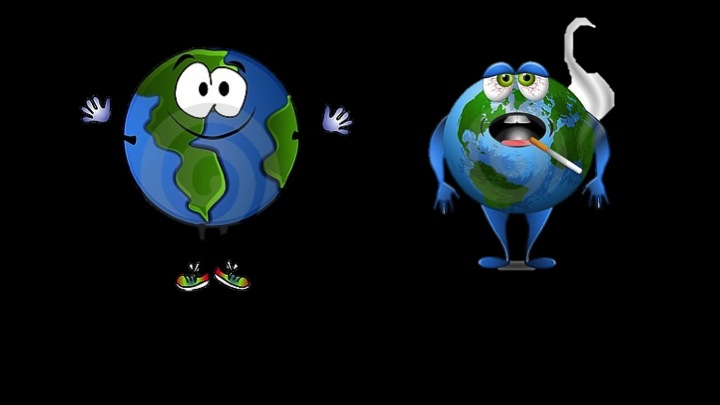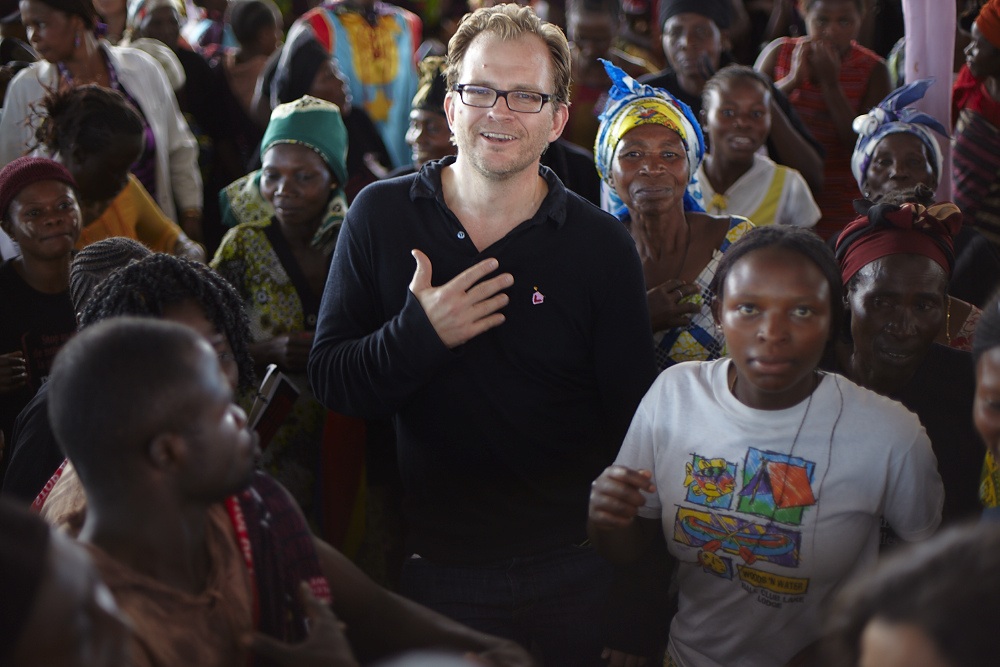I'm stuck in a bad relationship.
I think you're stuck in a bad relationship too.
In fact, I think we're all stuck in a bad relationship.
And I'll tell you why. Starting with a little story.
Two planets walk into a bar.

One has amazing peaks, and lush valleys, and deep blue oceans. She has clear skies and verdant forests.
The other planet? She's sick, she's barren, she's pockmarked and brown, and burning up with a fever.
They belly up to the bar, size each other up.
The healthy planet looks over at the sick planet and says, "Darlin', you don't look so well. Do you really think you should be out? Shouldn't you be home resting?"
The sick planet says, "Well, if you had just gotten the news that I got from my doctor, you'd need a drink too."
"Why what's wrong?"
"Well, he just said I have a case of something called the Humans."
The healthy planet says, "Oh don't you worry about that! I used to have Humans and look at me now."
The sick planet says, "Well, how'd you get better?"
"Well darlin', I just got rid of them."
As this joke and its dark humor illustrates, the planet -- Earth -- will be fine without us, but we cannot live without a healthy planet.
We are stuck in a bad relationship with planet Earth, with Mother Earth. And what's the hallmark of a good relationship? Respect, trust, communication.
Well, we're certainly not listening to the planet, are we? The planet is speaking loud and clear, if not screaming at us -- about deforestation, ocean acidification, climate change.
And we're just not listening, we're not responding. Rather, we just keep taking while our "partner" continues to suffer, while we thrive in so many ways.
Well, it's not just the planet that we're stuck in a bad relationship with -- it's women and girls as well.
As the planet suffers, we see that women and girls suffer too.
The UN recently released a report on this very topic: women, gender equality, and climate change. The report states:
Women are more vulnerable to the effects of climate change than men -- primarily as they constitute the majority of the world's poor and are more dependent on their livelihood on natural resources that are threatened by climate change. Furthermore, they face social, economic, and political barriers that limit their coping capacity.
So, what do we do? How do we get out of this bad relationship and how do we learn from what's going on?
A year ago, I was fortunate enough to journey to a place where these two challenges -- these two bad relationships -- are more interlinked than anywhere else perhaps on planet Earth.
I joined V-Day, their amazing founder Eve Ensler, and others on a trip to the Democratic Republic of Congo, a place that is rich in so many ways, but particularly in natural resources, including rare-earth minerals. These rare-earth minerals are essential to our cell phones and other electronic goods that we have become so dependent on, which we supposedly "need" for our daily lives. And what's happened?
Armed militias, who depend on profiting from these rare-earth minerals, use rape of women and girls to control and continue to profit from these rare-earth minerals. Over half a million women and girls have been raped in the last 10 years alone in the Congo.
Why is the Eastern Congo the rape capital of the world, as a UN official recently put it? In great part because we're so dependent on these cell phones and electronic goods, and the rare-earth -- or conflict minerals -- needed to manufacture them.
During the journey to the Congo, we celebrated the opening the City of Joy -- a place that Eve and V-Day built as a community for women survivors of gender violence -- rape and other atrocities -- in Bukavu, in the Eastern DRC.
The theme of the celebration was "Turning Pain into Power."
At the opening of the celebration (an odd term to use given the pain, suffering and destruction), I was blessed to be able to dance with hundreds of local women. Many of these amazing woman had been raped multiple times and yet they danced with such incredible joy, and love.

As they danced, they didn't hold back their joy and love. They truly turned pain into power. And my life was forever changed by these beautiful, brave, joyous women.
On Jan. 28, the first class of the City of Joy -- the pilot class of 42 women who started last summer -- will graduate. V-Day recently shared this update on the first class at City of Joy:
This first class has taken part in a diverse and impactful six-month curriculum that includes: group psychotherapy; self-defense; English; literacy; communications; civic and political education including civil rights; comprehensive sexuality education; massage; physical education, and horticulture. The program was designed by local staff to address the unique emotional, physical, and intellectual needs of Congolese women survivors of gender violence, and to provide them with the tools necessary to return to and thrive in their communities upon graduation.
In April, I'm headed back to the Congo to further help turn pain into power -- well solar power, that is. Global Green has partnered with V-Day to green the City of Joy, and we will be installing a solar system to provide reliable, clean electricity, and reduce -- and eventually eliminate -- the need to rely on expensive, dirty diesel generators. (Big thanks to the generosity of the SunPower Foundation, as well as the 11th Hour Project and COINS Foundation for making this possible.)
Not only will their lights and other electrical needs be powered by the sun, we hope the women of the City of Joy can use the system for micro-enterprise (i.e. creating a solar-powered phone-charging business).
What can we do to help the reduce the conflict and end this unfathomable violence against women and girls -- and increasingly boys -- in the Eastern Congo? As consumers, we can make a difference by demanding cell phones and electronic goods that are conflict mineral-free. It is good to see progress being made on this front thanks to activists and consumers around the world.
But that's not enough. We need to stop allowing ourselves to be defined as consumers. We need reclaim our role as citizens. Yes, we need to vote and hold our leaders and elected officials accountable and demand action on these global issues of great importance.
But that's not enough, either. I think we need to empower and call upon all of us, not just reclaim our role as citizens, but to become citizen entrepreneurs: people who love their home, who love the earth, who connect the dots to the global challenges we face, and who take responsibility for a corner of their world. People who unleash their creativity in making their neighborhood, school, or community a better place, however big or small their idea.
Because if we don't, we risk what stands to be a very nasty break-up.
(This is the first part of a two-part blog -- in the next post, I will talk more about my call for a nation of citizen entrepreneurs as part of how we end our 'bad relationship' -- and is based on a talk I gave at TEDxWomen on Dec. 1, 2011.)
